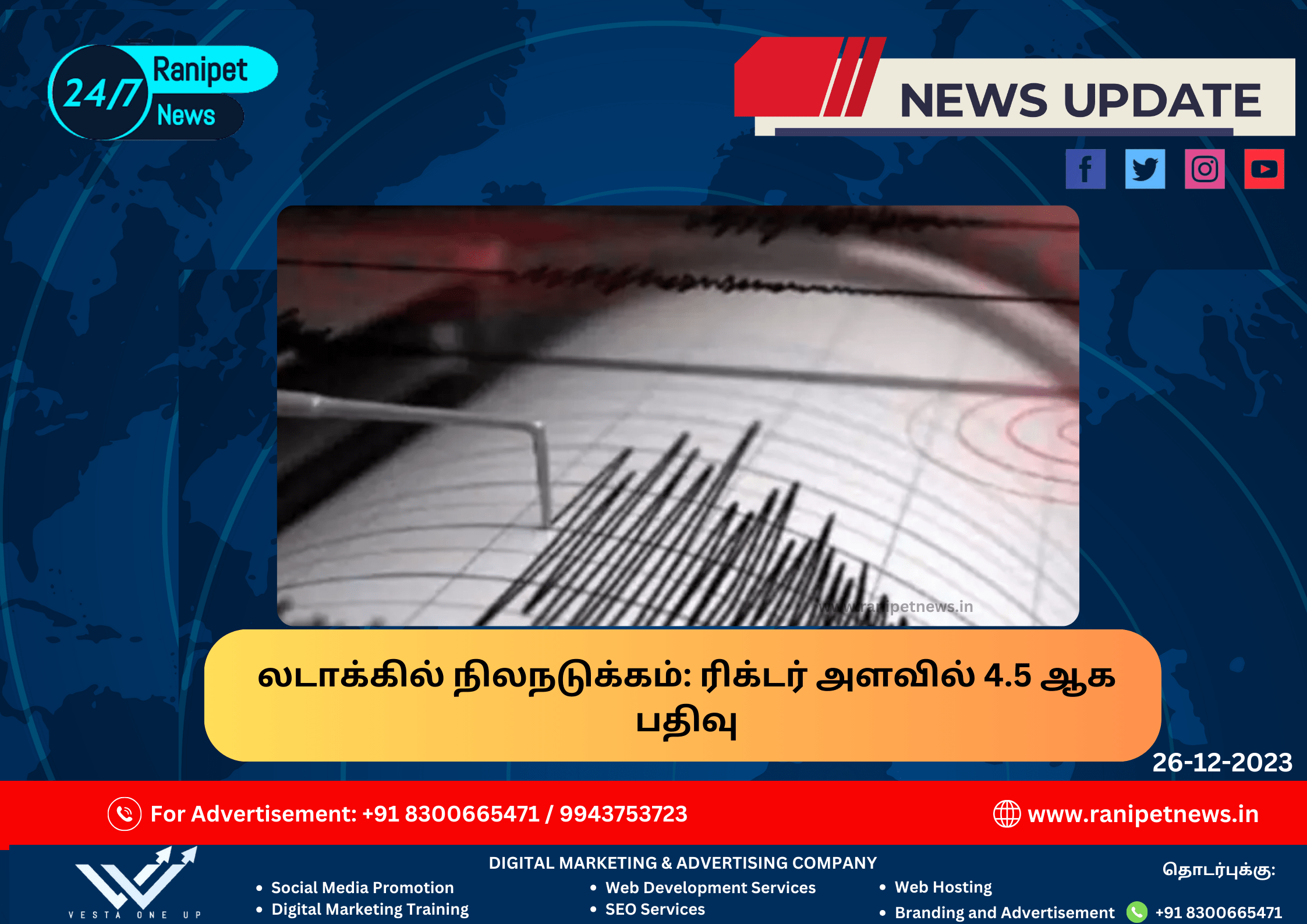Ranipet Government Hospital Address
Government Head Quarters Hospital, Walajah
Email : tnhspwalaja[at]gmail[dot]com
Pincode: 632513
Today's Ranipet News
Earthquake in Ladakh
The earthquake struck at 4.33 am today. An earthquake struck Leh in Ladakh this morning. The National Seismological Center reported that the magnitude of the earthquake was 4.5 on the Richter scale, which occurred at 4.33 am. The earthquake was centered at a depth of 5 km in Levee. Although buildings were slightly shaken due […]
Paddy Flood Relief Fund – Token Issue Launched
Chief Minister M. K. Stalin had announced that Rs 6,000 will be given as relief to family card holders. Due to the heavy rains in Thoothukudi and Nellai districts on the 17th and 18th, most of the areas were severely damaged by floods. On the orders of Chief Minister M.K.Stal, the Ministers, in flood repair […]
Fury over not keeping Nalli bone curry
The incident where the marriage was stopped due to Nalli Bone Curry has caused a shock. A young woman from Nizamabad in Telangana and a young man from Nahdia got engaged.As the argument ended, a clash broke out between the two sides. Both sides attacked each other. The police, informed about the incident, rushed to […]
ISL Football
The 10th edition of the Indian Super League (ISL) football tournament is underway in various cities. The 10th edition of the Indian Super League (ISL) football tournament is underway in various cities. The 12 participating teams are local,2 matches on away basis. The top 6 teams at the end of the league will qualify for […]
Government hospitals, also known as public hospitals, are healthcare facilities that are owned and operated by the government. These hospitals play a vital role in providing healthcare services to the general population, especially to those who may not have access to private healthcare facilities due to financial constraints. Government hospitals typically offer a wide range of medical services and facilities, which may include:
Emergency and Trauma Care: Government hospitals have dedicated emergency departments to provide immediate medical attention to patients with severe injuries or life-threatening conditions.
Outpatient Services: These services include medical consultations, diagnosis, and treatment for patients who do not require hospital admission.
Inpatient Services: Government hospitals offer hospitalization and inpatient care for patients who need further medical treatment or surgical interventions.
General Medicine: Diagnosis and treatment of various medical conditions such as respiratory infections, gastrointestinal issues, diabetes, hypertension, etc.
Pediatrics: Specialized medical care for infants, children, and adolescents.
Obstetrics and Gynecology: Services related to pregnancy, childbirth, and women’s health.
Surgery: Government hospitals may provide surgical procedures, ranging from minor surgeries to major operations.
Intensive Care Units (ICUs): Critical care units for patients with severe illnesses or injuries, equipped with advanced medical technology and highly trained staff.
Laboratory and Diagnostic Services: Facilities for blood tests, imaging services (X-rays, CT scans, MRI), and other diagnostic tests.
Vaccination and Immunization Programs: Government hospitals often participate in public health initiatives and vaccination campaigns to prevent the spread of infectious diseases.
Mental Health Services: Some government hospitals may have psychiatric departments to provide mental health assessments and treatments.
Rehabilitation Services: Rehabilitation programs for patients recovering from accidents, surgeries, or chronic conditions.
Pharmacy Services: Government hospitals have pharmacies where patients can obtain prescribed medications.
Community Health Programs: Some government hospitals may run community health programs to address specific health concerns and promote preventive care.




